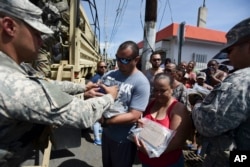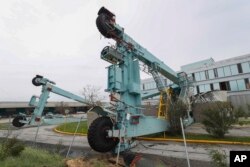The U.S. has temporarily suspended a law that officials said had been hampering the delivery of desperately needed aid to hurricane victims in Puerto Rico.
In a Twitter post Thursday, White House Press Secretary Sarah Huckabee Sanders said President Donald Trump had waived the law known as the Jones Act, effective immediately, at the request of Puerto Rico's governor Ricardo Rossello.
Rossello, who has said the island of 3.4 million people is facing a "humanitarian disaster,” immediately responded to the announcement with a "thank you" tweet.
While delivering aid Wednesday in the southern town of Salinas, Rossello told reporters “This is the single biggest, major catastrophe in the history of Puerto Rico, bar none, and it is probably the biggest hurricane catastrophe in the United States.”
Shortly before meeting Trump Thursday, Acting Department of Homeland Security Secretary Elaine Duke issued a statement saying, “This waiver will ensure that over the next ten days, all options are available to move and distribute goods to the people of Puerto Rico. It is intended to ensure we have enough fuel and commodities to support lifesaving efforts, respond to the storm, and restore critical services and critical infrastructure operations in the wake of these devastating storms.”
The Jones Act, passed by Congress in 1920 and signed by President Woodrow Wilson, requires that all ships traveling between American ports must be U.S. flagged ships - even if they are not the most readily available. Critics have called the act anachronistic and argue that it is stalling recovery efforts in the badly damaged island territory that was hit by two massive storms in quick succession this month.
Earlier this week, the Department of Homeland Security said waiving the act for Puerto Rico would not help struggling hurricane victims because the island's ports and other infrastructure were so badly damaged that ships would not be able to dock there.
The island's power grid was nearly destroyed by Hurricane Maria, leading officials to predict it may take many months to completely restore reliable electricity service - affecting access to medical treatments and running water, as well as depriving millions of air conditioning in tropical heat.
President Trump is slated to visit Puerto Rico and the U.S. Virgin Islands next Tuesday, but he has been roundly criticized for the slowness of Washington's response to the island's plight.
Critics had noted that he waived shipping restrictions much more quickly following hurricanes that hit recently in Texas, Louisiana and Florida. After the president offered support for hurricane victims in Puerto Rico earlier this week, saying the territory was "in deep trouble in part because of problems that predated Hurricane Maria" an opinion piece in the Washington Post bluntly asked "Did Trump Just Figure Out Puerto Ricans are Americans?"
Apparently stung by the criticisms, administration officials have emphasized the complexity of delivering aid to the island.
"This is a logistically challenging, unique event that the United States hasn’t seen in a very, very long time if ever," said Federal Emergency Management Agency Director Brock Long. "You have to remember that not only did Irma come through and create quite a bit of damage and destruction that we were working to repair, but Maria was... one of the strongest storms that Puerto Rico’s seen since the 20’s and let’s face it, the infrastructure is weak and there were no building codes and so there is a lot of devastation and we understand that.”
In Washington Thursday, House Democrats called for immediate legislation to assist Puerto Rico and the U.S. Virgin Islands as early as next week.
During a briefing, Congresswoman Nydia Velazquez (D-NY) said she found the conditions “shocking” when she visited the island on Friday.
“Those images were burned into my mind. Yet, what I also saw was inspiring. The spirit of the Puerto Rican people who refuse to quit, who will not give up and who want to get back to rebuilding the island they love,” she added.
Prominent Puerto Rican and Caribbean athletes and entertainers have urged the administration to act more forcefully to help victims who have been without basic needs for days. The singer Rihanna, a native of Barbados, Thursday posted a picture of a New York Daily News front page pleading with the president to act.
Bloomberg News reported Thursday that mountains of aid had already arrived at Puerto Rico's ports, but was languishing on docks waiting for distribution. The agency quoted a spokesman for a Florida-based shipping company as saying thousands of 20-foot containers of food, water and soap were piling up at docks in the Puerto Rican capital, San Juan.
Esha Sarai contributed to this report.






